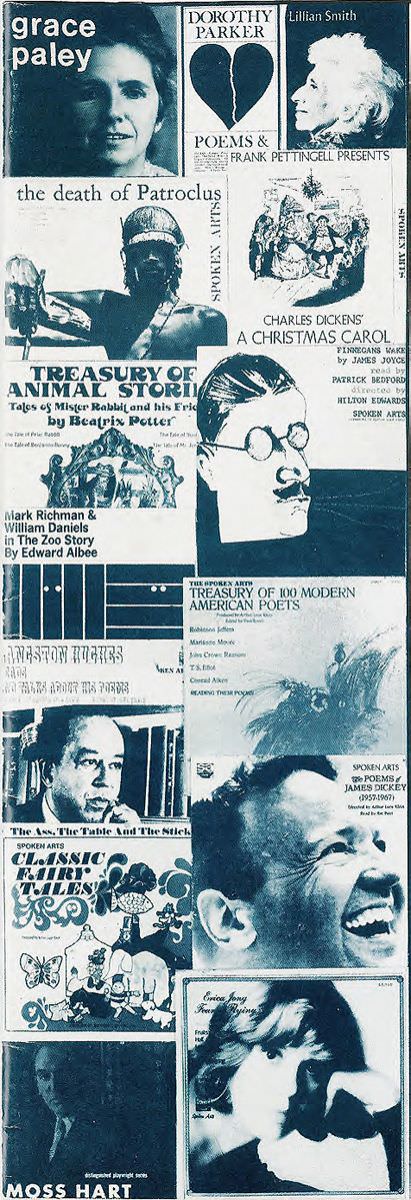Historical Sound Recordings
Spoken Arts: a brief history
 In 1956 Dr. Luce and Arthur Klein founded Spoken Arts Inc. and began to offer a unique array of recordings of the spoken word. At the time of it’s founding, only one other company was actively pursuing such recording projects. The Kleins recognized early on the educational potential for recordings of the spoken word, focusing their initial efforts on a limited range of material. The inaugural recordings were very well received by noted critics of the time, including Irving Kolodin of The Saturday Review. As its products gained popularity, the company took on more ambitious projects. Ultimately, Spoken Arts became recognized as one of the most important spoken word recording companies, pointing the way to a thriving books-on-tape industry later in the century.
In 1956 Dr. Luce and Arthur Klein founded Spoken Arts Inc. and began to offer a unique array of recordings of the spoken word. At the time of it’s founding, only one other company was actively pursuing such recording projects. The Kleins recognized early on the educational potential for recordings of the spoken word, focusing their initial efforts on a limited range of material. The inaugural recordings were very well received by noted critics of the time, including Irving Kolodin of The Saturday Review. As its products gained popularity, the company took on more ambitious projects. Ultimately, Spoken Arts became recognized as one of the most important spoken word recording companies, pointing the way to a thriving books-on-tape industry later in the century.
The breadth of the company’s production was extraordinary; including everything from children’s literature to classic European and American novels, short stories, folk and fairy tales, poetry, drama, essays, humor, and historical speeches. Spoken Arts became quite well-known for its recordings of distinguished authors reading their own works. Writers such as Arthur Miller, Dorothy Parker, Langston Hughes, Cynthia Ozick, William Butler Yeats, Nadine Gordimer, Pablo Neruda, Gertrude Stein, James Baldwin, Cornelia Otis Skinner, S.J. Perelman, Grace Paley, W. H. Auden, Elie Wiesel, and Anais Nin are only a few of those represented in the archive.
Although the collection’s strengths lie in a variety of literature studies, Spoken Arts also produced interviews of noted historical figures in science and political history. Those recordings now stand as oral histories from the period and were relatively rare in the spoken word recordings industry at the time. For instance, the collection includes a rare interview with the physicist, Dr. Edward Teller, sometimes referred to as the “father of the hydrogen bomb”. One of the more poignant recordings, now a snapshot of 20th century history is the recording of the noted Australian pediatrician, Dr. Helen Caldicott reading her paper entitled, “Nuclear Holocaust: The Medical Consequences of Nuclear War and Nuclear Power.”
Spoken Arts also offered recordings of the inaugural addresses of John F. Kennedy, Harry Truman and all four inaugural addresses of Franklin Delano Roosevelt. All of these types of recordings proved to be invaluable to the study of American history before the onset of the more fully developed media market of the present.
Adding to its already broad repertoire, Spoken Arts also produced several series of non-English language materials including surveys of French, German and Spanish drama, literature, poetry and music; samplings of Italian and Russian poetry; the Psalms read in both English and Hebrew; and Chinese folk and art songs.